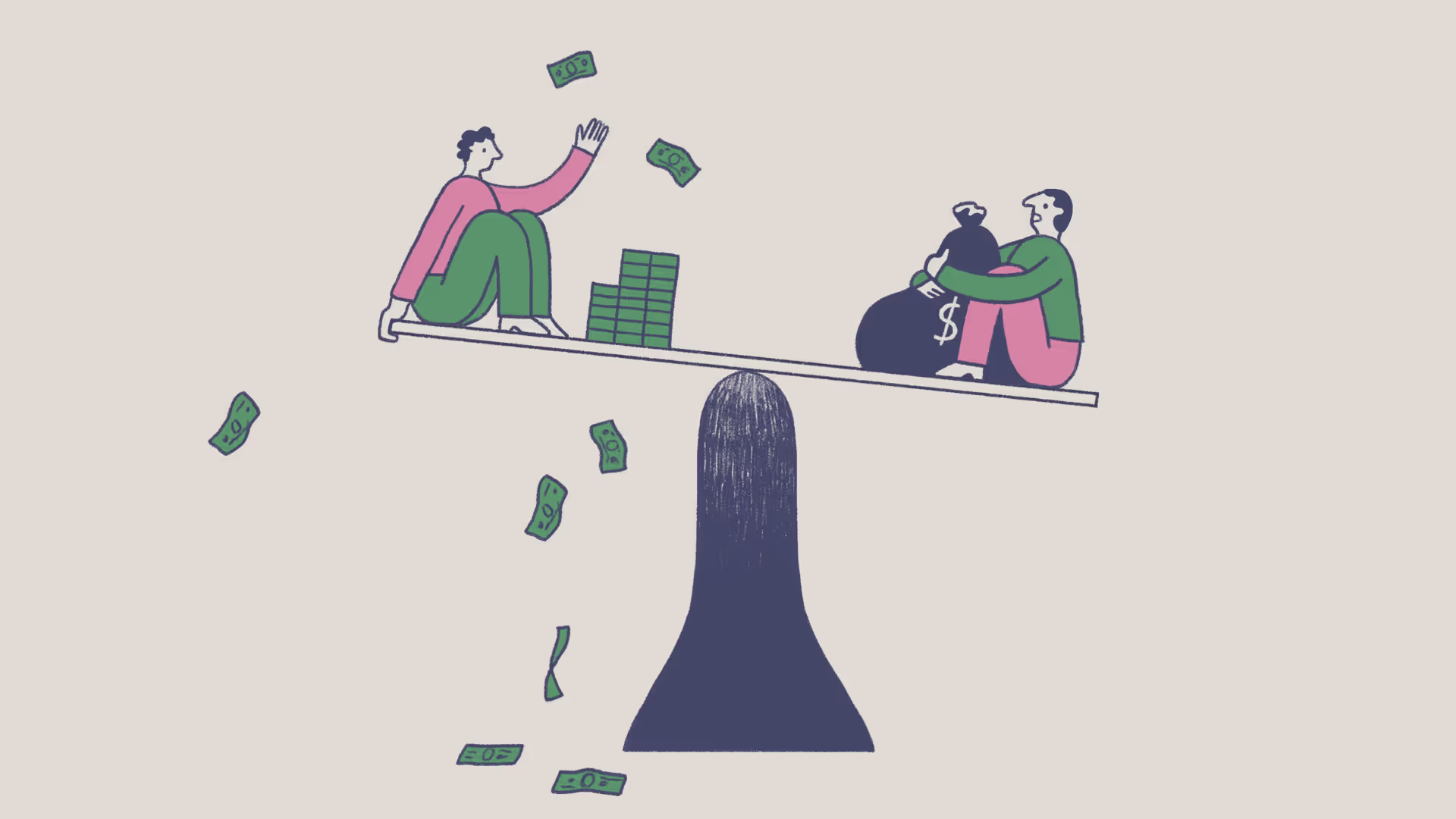Do any of these scenarios sound familiar?
Ever since your partner lost their job, things have been tight; but every time you talk about it, they shut down.
You’re spending your own money online shopping, but still, your partner judges every time you receive a package. It was annoying; now it’s tense.
Your partner makes significantly more than you but you want to have an equal say in your shared finances. You’re wondering how to address it when you feel like you don’t have a leg to stand on.
You found out that your partner has a ton of debt and they let it get out of hand. You want to be supportive, but you can’t get past how irresponsible you feel they’ve been. Now they feel judged and regret ever bringing it up.
Your fiancé is asking for a prenup. You feel it means they don’t trust you and want to protect their money from you, even though you say you know your feeling isn’t rational.
You feel like you never know when it’s the right time to bring up finances. And you’re afraid if you do, the love and romance will suffer. Most of all, you wonder why it’s all so heavy in the first place. It’s just money, right?
The 5 Things We Often Forget About Financial Tension in Relationships
- We live in a society that places high value on financial success even though it’s also a society that makes attaining financial security difficult.
- Individually, we form a complex relationship with our finances based on how societal messages about money are communicated to us via our families and institutions.
- We carry that long lineage of beliefs and behaviors—as well as quite a few taboos—into our relationships. So does our partner.
- Even though many of us have been financially active for most of our lives, humans only have little more than half a century of experience talking about money with their partners.
- Most importantly, we often forget… money is never just about money.
Let’s do a quick historical recap. Marriage has always been an economic enterprise, an alliance of families, land, resources, and wealth. Love, and certainly sex, didn’t enter the equation until the late-eighteenth century. And in the western world gender equality didn’t come into play until the 1970s. Traditionally, in heterosexual marriages, the man worked outside the house, gave a portion of whatever he made to his wife, and his wife made do with whatever she was given. The husband had authority and the wife figured out her zone of independence within his control.
A lot has changed. Marriage is no longer only between a man and woman. Gender roles are flexible and, for some couples, obsolete. Women make up half of today’s workforce and many American women outearn their husbands. Marriage itself has become highly optional. These days, the typical conversation isn’t about what a husband is willing to give his wife as an allowance; it’s whether a couple will open a joint bank account. With the old rules out the door, we’ve had to create new ones.
And that means talking about money—no easy feat. But it’s also an opportunity to understand the deeper beliefs and vulnerabilities money represents in our relationships and how we can use it to grow our financial partnerships.
Money Is Never Just About Money
Currency was invented as a representation of value, so keep in mind, our beliefs and taboos about money aren’t typically about dollars and cents—it’s about what it represents. And in many countries it’s also about how those representations are shaped by capitalist society. Money is about status, access, comfort, freedom, interdependence, trust, loyalty, betrayal, fairness, and more. Money is tied to our sense of self-worth and our feelings of power and powerlessness. Financial success is often interpreted as proof that we’re “doing something,” and even more so, that we’re “worth something.” Whereas financial failure can feel like we’ve failed at life itself and that we’ll never get out of the hole.
When those narratives enter our relationships, they become entire stories about who we are and how we live. It’s not about how much spending money we give the kids, it’s about whether we’re generous or cheap, or trying to be the “favorite” parent. It’s not about how many times a week we go out to dinner, it’s about whether we feel taken care of, considered, lavished. When we discuss what trip to take, what home renovation to make, what wedding gift to give, we are really asking: where do we deserve to go and what do we want to show people on Instagram? What kind of home do we want to have? How much do we value our relationship to the bride and groom and how do we communicate that?
We all respond differently to those implicit questions based on how we were raised. If we witnessed our father get laid off, fall into depression and drink, and then be berated by our mother for it, our ideas about success, failure, and vulnerability in our own partnership is going to be tied to that experience. If we had less money than our friends growing up, we might always have a chip on our shoulder about needing to prove our worth. If we were raised in an affluent family and marry someone who was not, we may not even realize why financial discussions are so difficult for our partner. The list goes on. And, by the way, all of this is true for friendships, siblings, roommates, and colleagues.
Our response to financial tension in relationships is also based on how we’ve raised ourselves. Because people are marrying, on average, ten years later than previous generations did, by the time we enter into marriage, many of us have already established economic independence, worked multiple jobs, made large purchases, and cultivated debt along the way.
By the time we join financial forces with a partner, we’ve written an entire encyclopedic collection of stories about money and what it represents, often without realizing it. Why is it all so heavy? Because we equate money with love. We withhold money as punishment. We enforce compliance through money. We live with the belief that we could always be making more and that having more is better. We idolize the wealthy and the homes, cars, vacations, and clothes they show us on social media. We live with the stigma that people who have a lot of debt have weak characters, especially if we’re thinking of ourselves, all the while forgetting that important reminder. We live in a society that places high value on financial success even though it’s also a society that makes attaining financial security difficult.
It’s time to re-evaluate what success and security really represent for you.
The Money Questions to Ask Your Partner Now
Pandemic, wildfires, hurricanes, job loss, prolonged uncertainty. The narratives we’ve built up about money just got a whole bunch of new characters and plot lines. We have the power to write the next chapter. Plan instead of panic. This is a year of reprioritization across the board, from how we live, work, parent, and play to how we spend and save. It’s an important time to make plans for the unexpected. Remember, money is never just about money—financial plans are also emotional plans. Not just asking “what should we cut if one of us gets laid off,” but adding “how will we support each other if one of us gets laid off.” It’s about prepping a go bag in advance of an impending climate event and having the hard conversation about what the items in that bag mean to us.
Recently, I was invited by a company that helps millennials with finances to lead three couples sessions for a virtual event. In choosing me, a relationship therapist, to discuss money matters in couples, they understood what we’ve been writing about here. Financial challenges are driven by the health of our relationships. That’s why money is one of the leading causes of divorce. Along with hosts Lauren Speed-Hamilton and Cameron Speed, we discussed the following questions.
As we embark on making new financial and emotional plans, getting to the heart of what money represents for us, and deepening our financial partnerships, these are the questions to ask each other now.
- What does having money mean to you?
- What does it mean to be good with money?
- Did your family talk about money growing up?
- Do you think your parents were good with money?
- On a scale of 1-10 how would you rate how we spend our money?
- If I spent $100 on something and didn’t tell you, would you be upset with me? How about $1,000?
- What decisions do we make about money that are individual versus team?
- Why don’t you buy me gifts? / What do you think about when you buy me gifts?
- What is your biggest money regret or mistake?
- What keeps you up at night about our finances?
- Do you appreciate the gifts I buy you? Why or why not?
- Why is it so hard for you to ask for a raise?
- What would we do if one of us were laid off?
- How has the pandemic changed how you think about our finances?
- What are our financial goals?
- Do you feel like we're on track financially to achieve our goals?
- What’s one money habit that you admire about me?







.svg)





